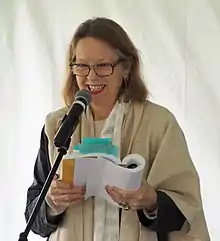Sarah Arvio
Sarah Arvio (born April 3, 1954) is an American poet, essayist and translator.
Sarah Arvio | |
|---|---|
 | |
| Born | April 3, 1954 |
| Genre | Poetry |
| Notable awards | Rome Prize, Guggenheim Fellowship |
She is the author of Visits from the Seventh, Sono: cantos, and night thoughts: 70 dream poems & notes from an analysis and a combined edition of Sono and Visits from the Seventh.
She has won the Rome Prize in Literature from the American Academy of Arts and Letters, a Guggenheim fellowship,[1] a Bogliasco fellowship,[2] and a National Endowment for the Arts Translation Fellowship, and other honors.
Life
Arvio has lived in Caracas, Mexico City, Paris, Rome and New York. She works as a translator for the United Nations in New York and Switzerland; she has also taught poetry at Princeton. [3]
Career
Arvio has been widely published in journals and magazines. Her work has also appeared in many anthologies, including The Best American Poetry 2015, The Best American Poetry 1998, The Best American Erotic Poetry, Women's Work, the FSG Book of 20th Century Italian Poetry, the Oxford Book of Latin American Short Stories, and Ariadne's Thread: A Collection of Contemporary Women's Journals.
The poet and philosopher John Koethe, in his citation for Arvio's Boston Review prize, said this:
The idea of the distinctive poetic voice…seems central to Sarah Arvio’s poetry, which sounds like no one else’s. Yet the voice in her poems seems to emanate from a kind of psychic doppelganger, originating from an imagined self somewhere outside her and passing through her on the way to the reader. It writes the self from which it issues, rather than the other way around, and is constructed out of wordplay and verbal associations… The results are poems that possess both an eerie psychological presence and a blunt verbal materiality.[4]
Her poems have been set to music: William Bolcom set “Chagrin” for mezzo-soprano and chamber ensemble in a song cycle entitled "The Hawthorn Tree”[5] (which also adapts poems by Louise Bogan, Willa Cather, Anne Carson, Stevie Smith and Elinor Wylie). Steven Burke set “Armor” in a monodrama entitled “Skin,” for mezzo-soprano and cello. Miriama Young composed “Côte d’Azur” as "Inner Voices of Blue,"[6] first for tenor and chamber ensemble, later resetting it for mezzo-soprano.
She was the translator and poetry editor for the film, Azul: Land of Poets (1988), directed by Roland Legiardi-Laura.[7][8] She also worked as a research associate for the landmark film series on American poets, Voices & Visions,[9] which aired on PBS in 1988.
Awards and honors
- 1992: National Endowment for the Arts Translation Fellowship
- 1997: Paris Review's B.F. Connors (long poem) Prize
- 1999: Poetry's Frederick Bock Prize[10]
- 2003-2004: Rome Prize
- 2005-2006: Guggenheim Fellowship
- 2008: Boston Review Annual Poetry Contest
- 2012: Bogliasco Fellowship
Books
- Visits from the Seventh, New York : Alfred A. Knopf, 2002. ISBN 9780375413674, OCLC 634762552
- Sono: Cantos, New York, N.Y: Knopf, 2006. ISBN 9780307263230, OCLC 637348196
- Sono : with Visits from the seventh, Northumberland: Bloodaxe Books, 2009. ISBN 9781852248444, OCLC 430930631
- Night thoughts: 70 dream poems & notes from an analysis, New York: Knopf, 2014. 2013 ISBN 9780375712227, OCLC 883425228
- Translation
References
- "Sarah Arvio". gf.org.
- "Home | Bogliasco Foundation". www.bfny.org. Retrieved 2022-08-12.
- Author website Archived 2014-02-03 at the Wayback Machine
- Boston Review (November 1, 2008). ,
- Schweitzer, Vivien (2010-10-22). "Surrendering to Muses, Poetry and Song Unite". The New York Times. ISSN 0362-4331. Retrieved 2022-08-12.
- "Inner Voices of Blue"
- "Sarah Arvio - Filmography - Movies & TV - NYTimes.com". www.nytimes.com. Archived from the original on 4 March 2014. Retrieved 15 January 2022.
- "Bombsite"
- Voices & Visions
- Poetry Magazine Prizes Archived 2012-06-14 at the Wayback Machine,
External links
- Sarah Arvio's Web Site
- Arvio's Author Page at Knopf
- Lisa Williams reviews night thoughts on In My Own Accent, Accents Radio February 2, 2013: http://katerinaklemer.com/ownaccent/accents-on-books-with-lisa-williams/
- Grace Cavalieri reviews night thoughts on Washington Independent Review of Books, February 12, 2013 http://www.washingtonindependentreviewofbooks.com/features/february-exemplars-poetry-reviews
- Jenny Xie, “The Poetic Unconscious: An Interview with Sarah Arvio,” in the Los Angeles Review of Books, October 19, 2013. http://lareviewofbooks.org/interview/the-poetic-unconscious-an-interview-with-sarah-arvio
- Brian Brodeur, “How A Poem Happens,” November 15, 2011 http://howapoemhappens.blogspot.com/2011/11/sarah-arvio.html
- Sono reviewed in “Books Briefly Noted,” The New Yorker, May 8, 2006 http://www.newyorker.com/archive/2006/05/08/060508crbn_brieflynoted2
- Sono reviewed in “Poet’s Choice,” Robert Pinsky, in The Washington Post, March 5, 2006 https://www.washingtonpost.com/wp-dyn/content/article/2006/03/02/AR2006030201513.html
- Visits from the Seventh reviewed in “Books Briefly Noted,” The New Yorker, February 18, 2002 http://www.newyorker.com/archive/2002/02/18/020218crbn_brieflynoted4
- On "Wild Nights" by Emily Dickinson in Poetry Society of America, February, 2014 http://www.poetrysociety.org/psa/poetry/crossroads/old_school/sarah_arvio